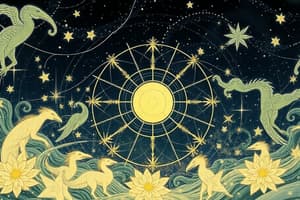Podcast
Questions and Answers
What does refraction refer to in the context of light behavior?
What does refraction refer to in the context of light behavior?
- The bouncing of light off a surface
- The combination of waves to form a larger wave
- The spreading of light through an aperture
- The bending of light as it passes from one medium to another (correct)
Which principle reflects the concept that the speed of light in a vacuum is constant for all observers?
Which principle reflects the concept that the speed of light in a vacuum is constant for all observers?
- Einstein's theory of general relativity
- Einstein's theory of special relativity (correct)
- Wave-particle duality
- Quantum mechanics
What is interference in the context of wave behavior?
What is interference in the context of wave behavior?
- The spreading of light as it passes around obstacles
- The bouncing off a surface to change direction
- The bending of light when passing through different media
- The combination of two or more waves to create a new wave (correct)
Which concept in modern physics primarily involves the study of subatomic particles and their properties?
Which concept in modern physics primarily involves the study of subatomic particles and their properties?
How does general relativity describe gravity?
How does general relativity describe gravity?
What does Newton's first law of motion state?
What does Newton's first law of motion state?
Which formula correctly expresses Newton's second law?
Which formula correctly expresses Newton's second law?
According to the law of conservation of momentum, what happens in an isolated system?
According to the law of conservation of momentum, what happens in an isolated system?
Which statement best describes the second law of thermodynamics?
Which statement best describes the second law of thermodynamics?
In which situation would gravitational potential energy be at its maximum?
In which situation would gravitational potential energy be at its maximum?
What characterizes electromagnetic waves?
What characterizes electromagnetic waves?
What does the first law of thermodynamics address?
What does the first law of thermodynamics address?
Which phenomena fall under the study of optics?
Which phenomena fall under the study of optics?
Flashcards
Newton's First Law
Newton's First Law
An object at rest stays at rest and an object in motion stays in motion with the same speed and in the same direction unless acted upon by an unbalanced force.
Newton's Second Law
Newton's Second Law
The acceleration of an object is directly proportional to the net force acting on it and inversely proportional to its mass.
Momentum
Momentum
The product of mass and velocity (p = mv).
First Law of Thermodynamics
First Law of Thermodynamics
Signup and view all the flashcards
Second Law of Thermodynamics
Second Law of Thermodynamics
Signup and view all the flashcards
Electromagnetic Waves
Electromagnetic Waves
Signup and view all the flashcards
Reflection
Reflection
Signup and view all the flashcards
Kinetic Energy
Kinetic Energy
Signup and view all the flashcards
Diffraction
Diffraction
Signup and view all the flashcards
Special Relativity
Special Relativity
Signup and view all the flashcards
Quantum Mechanics
Quantum Mechanics
Signup and view all the flashcards
Study Notes
Classical Mechanics
- Classical mechanics describes the motion of macroscopic objects, such as planets, cars, and baseballs.
- It's based on Newton's laws of motion and universal gravitation.
- Newton's first law: An object at rest stays at rest and an object in motion stays in motion with the same speed and in the same direction unless acted upon by an unbalanced force.
- Newton's second law: The acceleration of an object is directly proportional to the net force acting on it and inversely proportional to its mass. (F = ma)
- Newton's third law: For every action, there is an equal and opposite reaction.
- Concepts of momentum and energy are fundamental to this field. Momentum is the product of mass and velocity (p = mv). Kinetic energy is the energy of motion (KE = 1/2 mv²).
- The law of conservation of momentum states that the total momentum of a system remains constant if no external forces act upon it.
- Work is the transfer of energy to or from an object by a force acting on it. Work is calculated by (W = Fd cosθ).
- Potential energy is stored energy. Gravitational potential energy is determined by height above a reference point (PE = mgh).
Thermodynamics
- Thermodynamics deals with heat and temperature and their relationship to other forms of energy.
- The zeroth law of thermodynamics deals with thermal equilibrium.
- The first law of thermodynamics states that energy can neither be created nor destroyed, only transformed from one form to another within a closed system. It's essentially the law of conservation of energy applied to heat.
- The second law of thermodynamics states that the total entropy of an isolated system can only increase over time. Entropy is a measure of disorder.
- The third law of thermodynamics states that the entropy of a system approaches a constant value as the temperature approaches absolute zero.
Electromagnetism
- Electromagnetism describes the relationship between electricity and magnetism.
- Electric charges generate electric fields, and moving electric charges produce magnetic fields.
- Electric fields exert forces on charges, and magnetic fields exert forces on moving charges.
- Maxwell's equations describe the fundamental laws of electromagnetism.
- Electromagnetic waves are transverse waves that propagate through space. Light is an example of an electromagnetic wave.
Optics
- Optics deals with the behavior of light.
- Reflection, refraction, diffraction, and interference are important concepts in optics.
- Reflection is the bouncing of light off a surface.
- Refraction is the bending of light as it passes from one medium to another.
- Diffraction is the spreading of light as it passes through an aperture or around an obstacle.
- Interference is the combination of two or more waves to create a larger or smaller wave.
- Lenses and mirrors are optical devices that use refraction and reflection to manipulate light.
Modern Physics
- Modern physics encompasses developments since the late 19th century, including relativity and quantum mechanics.
- Einstein's theory of special relativity deals with the relationships between space and time for observers in constant relative motion, and it implies that the speed of light in a vacuum is constant for all observers.
- Einstein's theory of general relativity extends special relativity to accelerated motion and gravity. It describes gravity as the curvature of spacetime caused by mass and energy.
- Quantum mechanics deals with the physical properties of nature at the scale of atoms and subatomic particles.
- Key concepts in quantum mechanics include quantization of energy, wave-particle duality, and uncertainty principle.
Studying That Suits You
Use AI to generate personalized quizzes and flashcards to suit your learning preferences.




